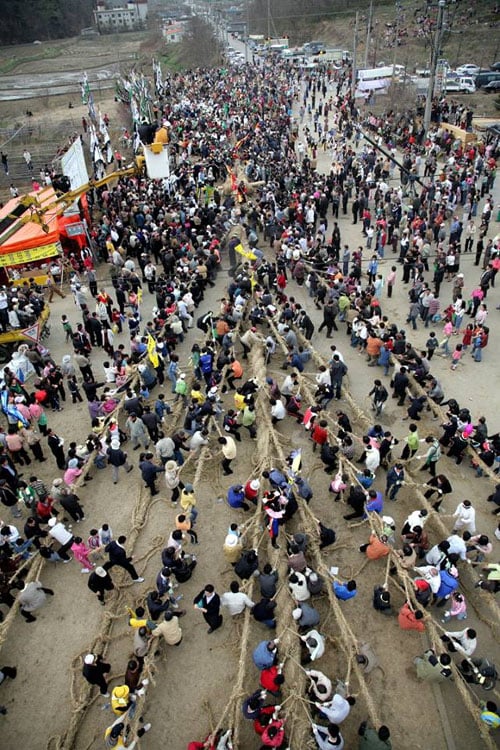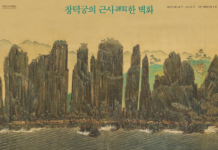
Farmers take part in a traditional juldarigi tug of war, praying for a good harvest. The juldarigi has now been listed as a UNESCO intangible cultural heritage item.
Juldarigi (줄다리기) is a traditional Korean tug of war. The contenders are grouped into two teams and they pull on a thick rope, hoping to dislodge the other side.
The origins of the Korean version of the game trace back many years to when people in agricultural communities conducted tugs of war praying for an “abundant harvest” (풍농, 豐農) that year. There are different styles of tug of war found in different regions across the peninsula, but what is common is that the people pull for their side as a ritual, praying for peace and for abundance in their community.
A traditional juldarigi tug of war can be performed by as few as a few dozen people, or even by as many as a few hundred or thousand. It is more than just a competition of strength. Juldarigi matches are used as a means of promoting unity and solidarity across the community, win or lose. Each individual on each team exerts his or her energy, pulling in the same direction, against the strength of the opposing team.
Nowadays, it’s common to see the mock battle performed not only at countryside festivals, but also during sports days at school or at large companies, too, as a way to strengthen unity and the spirit of team work. It has become a popular game that can be enjoyed by everyone, anywhere.
UNESCO has now recognized the value of these traditions and it has added the game to its list of the world’s intangible cultural heritage items.
UNESCO’s Intergovernmental Committee for the Safeguarding of Intangible Cultural Heritage decided to include the game as one of its intangible cultural heritage items during its 10th session held on Dec. 2 in Windhoek, the Namibian capital. The committee decided on the inclusion of the traditional tug of war in recognition of its cultural significance as a prayer for a good harvest and also since it promotes a spirit of community.
With this newest addition, Korea now has a total of 18 traditions on UNESCO’s list of intangible cultural heritage items. They include the royal ancestral ritual at the Jongmyo Shrine and its music, originally proclaimed in 2001, pansori epic chants (2003) and the Gangneung Danoje festival (2005). The traditional martial art taekkyeon was inscribed in 2011, “Arirang,” a lyrical folk song, in 2012, and kimjang, the process of making and sharing kimchi, added in 2013.
By Sohn JiAe
Korea.net Staff Writer
Photo: the Cultural Heritage Administration
jiae5853@korea.kr























